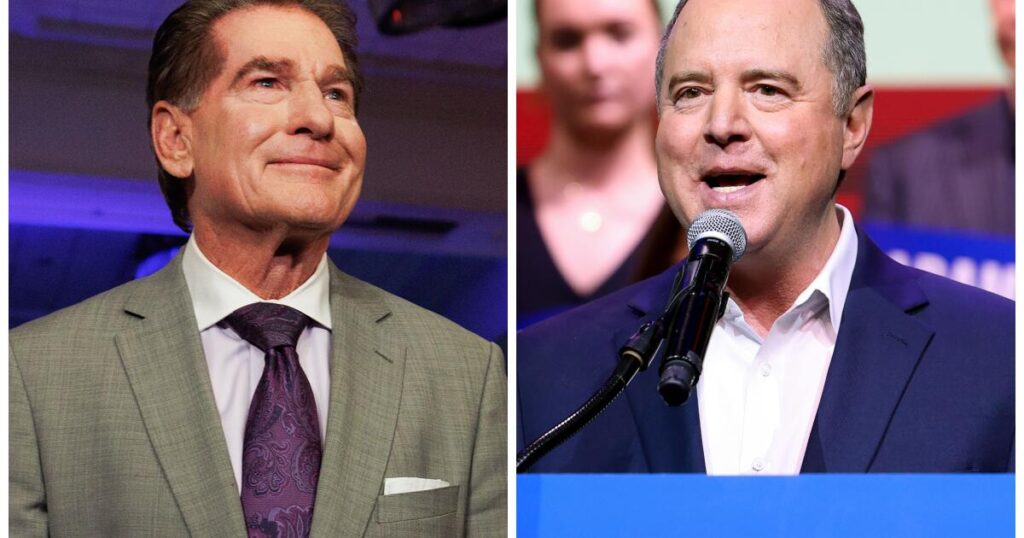[ad_1]

California voters on Tuesday were on the verge of deciding the historic election to replace the late Sen. Dianne Feinstein, a race that pitted Democratic Rep. Adam Schiff of Burbank against Republican and former Dodger All-Star Steve Garvey.
After an expensive and acrimonious primary battle among Democrats, the general election race for the seat was sleepy, bordering on dull.
Schiff and his allies spent more than $35 million during the primary on ads that called Garvey “too conservative for California.” The gambit helped to consolidate Republican support behind Garvey and vault him past fierce competitor Rep. Katie Porter, an Orange County Democrat, who finished a distant third.
Schiff remains a heavy favorite in the race, and has led Garvey by a wide margin in recent public opinion polls.
Garvey, 75, held few public events and struggled to gain traction with voters in a state that has not elected a Republican to statewide office in nearly two decades.
With a healthy lead in the polls, Schiff turned his attention to boosting Democrats in swing states, raising money for California’s House candidates and traveling out of state to stump for Vice President Kamala Harris and his future colleagues in the Senate.
“If this were the 2000 Senate race, then the competitive nature of California’s politics and Garvey’s relatively recent sports successes might have made him a very competitive candidate,” said Dan Schnur, a professor of political communication at USC, UC Berkeley and Pepperdine. “But given how the state has changed, and how many years have passed, it became almost an impossible uphill climb for him.”
A seat in the Senate, one of the most coveted in California politics, rarely comes open. The late Sen. Dianne Feinstein served in the Senate for more than three decades, and Sen. Barbara Boxer for nearly a quarter-century.
A Senate seat can also be a launching pad for higher office, as was the case for Harris, President Nixon and California Gov. Pete Wilson.
California’s ballot included two Senate questions. One asked voters to select Schiff or Garvey to serve out the remainder of Feinstein’s term, which ends in early January. The other asked voters to select one of the men to serve a subsequent six-year Senate term.
California’s election results will need to be certified before the winner can be sworn in, a spokesman for Senate Majority Leader Charles E. Schumer (D-N.Y.) said.
Regardless of who wins, California will have two male senators for the first time in more than three decades. Sen. Alex Padilla was elected in 2022 after being appointed to his post the year before when his predecessor, Kamala Harris, became vice president.
Garvey and Schiff entered the Senate race with name recognition and national profiles crafted in very different arenas: Garvey in Chavez Ravine, and Schiff on Capitol Hill.
During 18 years playing first base for the Dodgers and San Diego Padres, Garvey was known as “Mr. Clean” for his sweet-swinging home runs and his wholesome image.
Garvey toyed with the idea of running for Senate shortly after his 1988 retirement. But he was instead mired in scandal, including mounting debts and lawsuits and backlash from two children born out of wedlock.
He finally decided to run last year, he said, after deciding that the dysfunction in Washington was too much to bear.
Garvey leaned heavily on nostalgia to promote his campaign to California’s older voters. He sold signed baseballs for $100 on his campaign website and appeared at fundraisers beneath a banner showing him slugging a baseball.
As an assistant U.S. attorney in Los Angeles, Schiff won the conviction of Richard Miller, a former FBI agent charged with passing classified documents to the Soviet Union. After serving in the California Legislature as a pro-law enforcement Democrat, he was first elected to the House in 2002 and rose to national prominence 15 years later as a member of the House Intelligence Committee, investigating the Trump campaign’s alleged ties to Russia in 2016.
As the lead prosecutor in the first impeachment trial of Trump in the House of Representatives, the Burbank Democrat — once mocked by the former president as a “little pencil neck” — used Trump’s vitriol to propel himself to national fame. His role in the impeachment lionized him among fellow Democrats, demonized him among Republicans and seeded his campaign for the Senate.
Both men invoked Trump frequently on the campaign trail.
Schiff criticized Garvey for voting for Trump three times, including in this year’s primaries, and sought to yoke him to Trump’s most unpopular policy proposals, including mass deportations of people living in the country illegally.
California voters, Schiff said, do not want “some MAGA mini-me in a baseball uniform.”
Garvey called Schiff a liar for telling the American people there was evidence of collusion between Russia and Trump’s 2016 campaign. He also accused Schiff of pursuing a vendetta against Trump to burnish his own career.
“How can you think about one man every day and focus on that when you’ve got millions of people in California to take care of?” Garvey said during the only debate between the candidates last month. “I think it’s unconscionable.”
Garvey said repeatedly that he voted for “the best man for the job,” but didn’t seek the former president’s endorsement, which Trump described as a “big mistake.”
The sharpest elbows of the race were thrown during the primary, when California’s Democrats were forced to choose among Schiff, Porter and Rep. Barbara Lee of Oakland, all popular Democrats in their own right.
Schiff focused on his decades of experience, including his high-profile work managing Trump’s first impeachment trial and his role on the Jan. 6 House committee investigating the 2021 attack on the Capitol. Lee leaned on her longtime progressive, antiwar credentials. And Porter struck a populist tone, promising to stand up to corporate influence in Washington.
Garvey painted himself as an antidote to what he called California’s failed liberal leadership.
Times staff writer Paige St. John contributed to this report.
[ad_2]
Source link

